pytest简易教程(21):标记为预期失败 - xfail
pytest简易教程汇总,详见:https://www.cnblogs.com/uncleyong/p/17982846
应用场景
功能未开发完成,但是用例写了;
环境限制,已经知道会失败,也可以预期失败。
源码
1 2 3 4 5 6 7 8 9 10 11 12 13 14 15 16 | class _XfailMarkDecorator(MarkDecorator): @overload # type: ignore[override,misc,no-overload-impl] def __call__(self, arg: Markable) -> Markable: ... @overload def __call__( self, condition: Union[str, bool] = ..., *conditions: Union[str, bool], reason: str = ..., run: bool = ..., raises: Union[Type[BaseException], Tuple[Type[BaseException], ...]] = ..., strict: bool = ..., ) -> MarkDecorator: ... |
方法:xfail(condition=None, reason=None, raises=None, run=True, strict=False)
常用参数:
- condition:预期失败的条件
- reason:失败的原因
- run:布尔值,是否运行
- raises:抛出某类型异常,和用例中raise的异常类型一样,结果就是FAILED,否则结果是XFAIL
- strict,默认是False,strict=False,断言成功结果是XPASS,断言失败结果是XFAIL;strict=True,断言成功结果是FAILED,断言失败结果是XFAIL
使用方法:
@pytest.mark.xfail(condition, reason="xxx" )
函数/方法级预期失败
示例一:assert成功
1 2 3 4 5 6 7 8 9 10 11 12 | #!/usr/bin/env python# -*- coding: utf-8 -*-# @Author : 韧# @wx :ren168632201# @Blog :https://www.cnblogs.com/uncleyong/import pytest@pytest.mark.xfaildef test_case1(): print("代码开发中") assert 1==1 |
结果:X表示预期失败

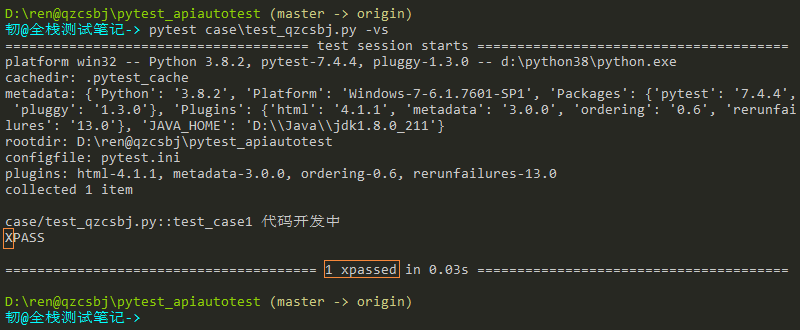
示例二:assert失败
1 2 3 4 5 6 7 8 9 10 11 12 | #!/usr/bin/env python# -*- coding: utf-8 -*-# @Author : 韧# @wx :ren168632201# @Blog :https://www.cnblogs.com/uncleyong/import pytest@pytest.mark.xfaildef test_case2(): print("代码开发中") assert 1==2 |
结果:
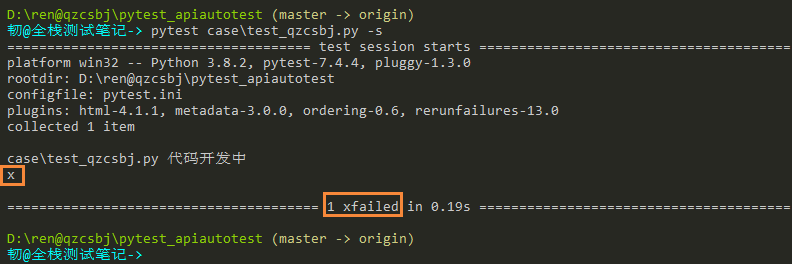
示例三:condition为true
1 2 3 4 5 6 7 8 9 10 11 12 | #!/usr/bin/env python# -*- coding: utf-8 -*-# @Author : 韧# @wx :ren168632201# @Blog :https://www.cnblogs.com/uncleyong/import pytest@pytest.mark.xfail(1==1, reason="代码开发中")def test_case3(): print("---xfail") assert 1==1 |
结果:
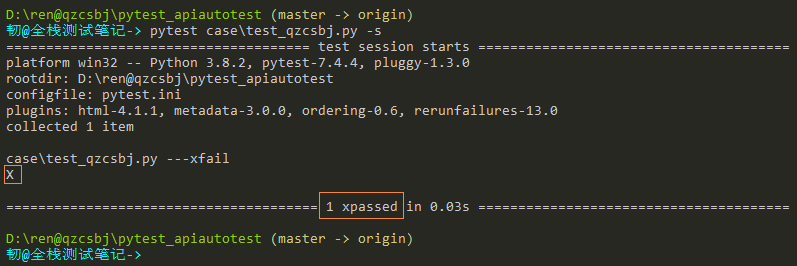
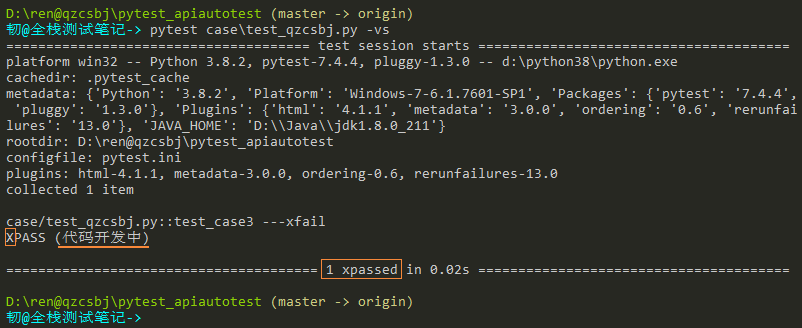
示例四:condition为false
1 2 3 4 5 6 7 8 9 10 11 12 | #!/usr/bin/env python# -*- coding: utf-8 -*-# @Author : 韧# @wx :ren168632201# @Blog :https://www.cnblogs.com/uncleyong/import pytest@pytest.mark.xfail(1==2, reason="代码开发中")def test_case3(): print("---xfail") assert 1==1 |
结果:
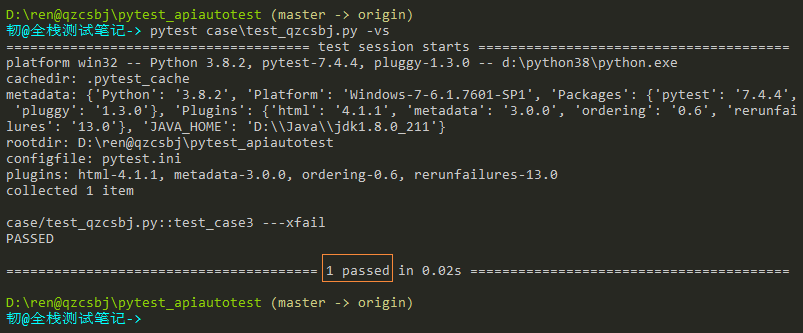
函数/方法执行过程中预期失败
示例:
1 2 3 4 5 6 7 8 9 10 11 12 | #!/usr/bin/env python# -*- coding: utf-8 -*-# @Author : 韧# @wx :ren168632201# @Blog :https://www.cnblogs.com/uncleyong/import pytestdef test_case4(): pytest.xfail("代码开发中") print("---xfail") assert 1 == 1 |
结果:pytest.xfail后面代码没执行
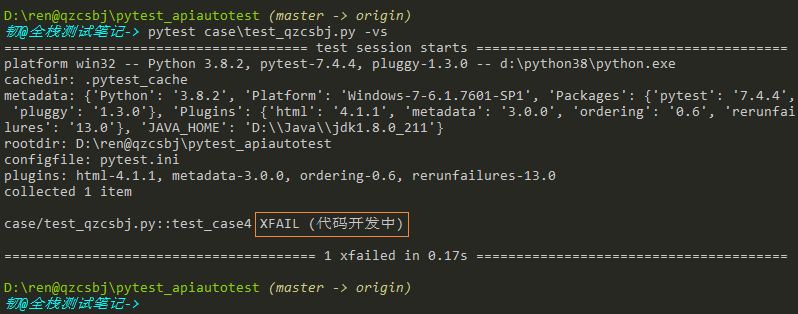
类级预期失败
1 2 3 4 5 6 7 8 9 10 11 12 13 14 15 16 17 | #!/usr/bin/env python# -*- coding: utf-8 -*-# @Author : 韧# @wx :ren168632201# @Blog :https://www.cnblogs.com/uncleyong/import pytest@pytest.mark.xfail(reason="当前环境没法测试")class Test01: def test_b(self): print("---test_b") assert 1==1 def test_a(self): print("---test_a") assert 1==2 |
结果:
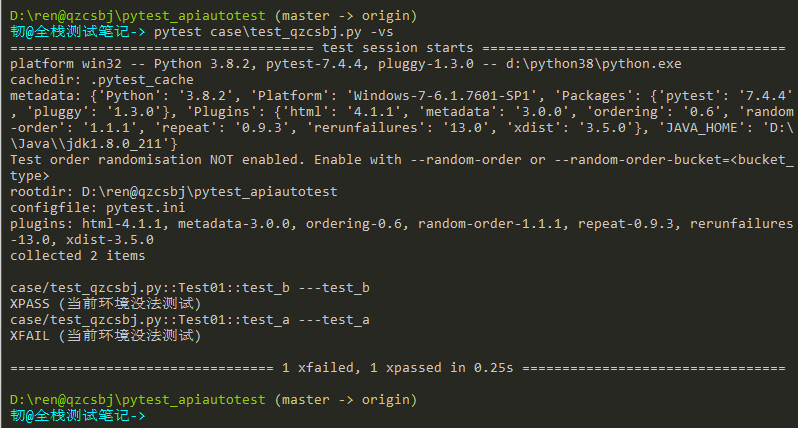
模块级预期失败
1 2 3 4 5 6 7 8 9 10 11 12 13 14 15 16 | #!/usr/bin/env python# -*- coding: utf-8 -*-# @Author : 韧# @wx :ren168632201# @Blog :https://www.cnblogs.com/uncleyong/import pytestpytestmark = pytest.mark.xfail(reason="当前环境没法测试")class Test01: def test_b(self): print("---test_b") assert 1==1 def test_a(self): print("---test_a") assert 1==2 |
结果:
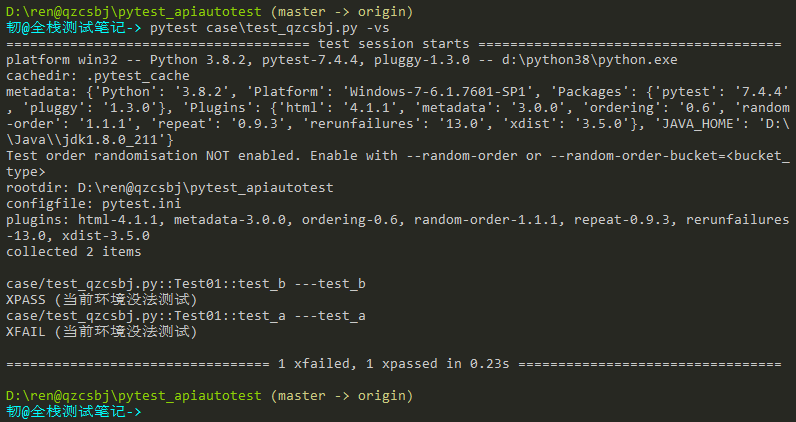
xfail方法run参数
默认是True
run=False不会执行方法
1 2 3 4 5 6 7 8 9 10 11 12 13 14 15 16 17 18 19 20 21 | #!/usr/bin/env python# -*- coding: utf-8 -*-# @Author : 韧# @wx :ren168632201# @Blog :https://www.cnblogs.com/uncleyong/import pytest@pytest.mark.xfail()def test_c(): print("---test_c") assert 1==1@pytest.mark.xfail(run=True)def test_b(): print("---test_b") assert 1==1@pytest.mark.xfail(run=False)def test_a(): print("---test_a") raise Exception("异常") |
结果:
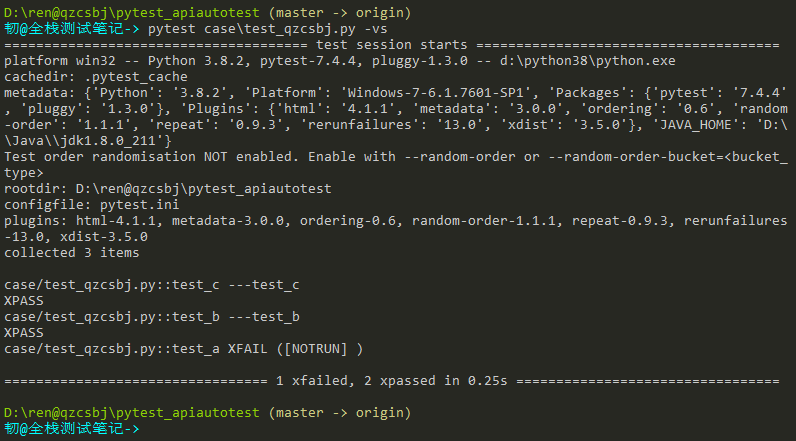
xfail方法raises参数
raises:抛出某类型异常,和用例中raise的异常类型一样,结果就是FAILED,否则结果是XFAIL
1 2 3 4 5 6 7 8 9 10 11 12 13 14 15 16 17 18 19 20 21 22 23 24 25 26 | #!/usr/bin/env python# -*- coding: utf-8 -*-# @Author : 韧# @wx :ren168632201# @Blog :https://www.cnblogs.com/uncleyong/import pytest@pytest.mark.xfaildef test_d(): print("---test_d") raise Exception("异常")@pytest.mark.xfail(reason="异常了")def test_c(): print("---test_c") raise Exception("异常")<br>@pytest.mark.xfail(raises=RuntimeError)def test_b(): print("---test_b") raise RuntimeError("运行时异常")@pytest.mark.xfail(raises=RuntimeError)def test_a(): print("---test_a") raise Exception("异常") |
结果:
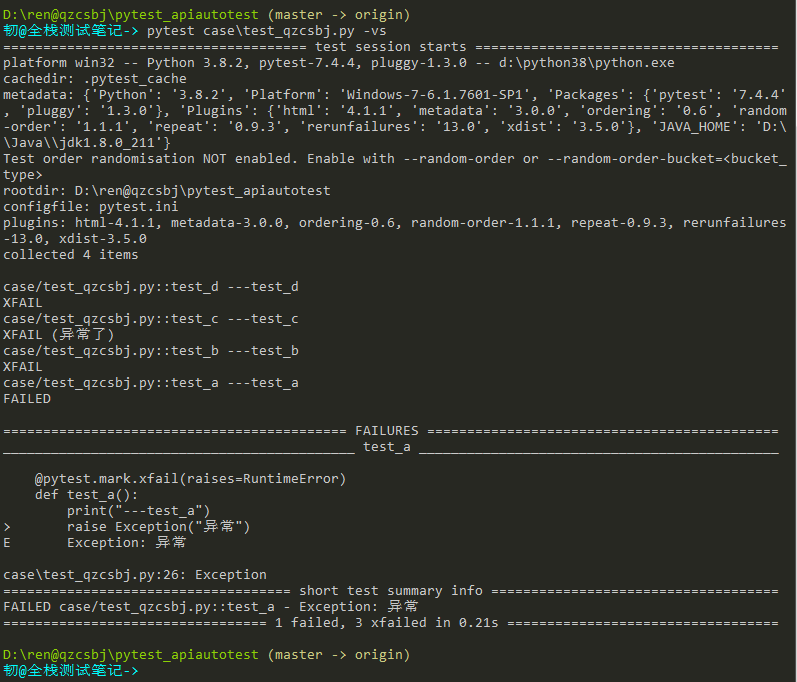
xfail方法strict参数
strict默认是False,strict=False,断言成功结果是XPASS,断言失败结果是XFAIL;strict=True,断言成功结果是FAILED,断言失败结果是XFAIL
1 2 3 4 5 6 7 8 9 10 11 12 13 14 15 16 17 18 19 20 21 22 23 24 25 26 27 28 29 30 31 32 33 34 | #!/usr/bin/env python# -*- coding: utf-8 -*-# @Author : 韧# @wx :ren168632201# @Blog :https://www.cnblogs.com/uncleyong/import pytest@pytest.mark.xfaildef test_f(): print("---test_f") assert 1==1@pytest.mark.xfaildef test_e(): print("---test_e") assert 1==2@pytest.mark.xfail(strict=False)def test_d(): print("---test_d") assert 1==1@pytest.mark.xfail(strict=False)def test_c(): print("---test_c") assert 1==2@pytest.mark.xfail(strict=True)def test_b(): print("---test_b") assert 1==1@pytest.mark.xfail(strict=True)def test_a(): print("---test_a") assert 1==2 |
结果:
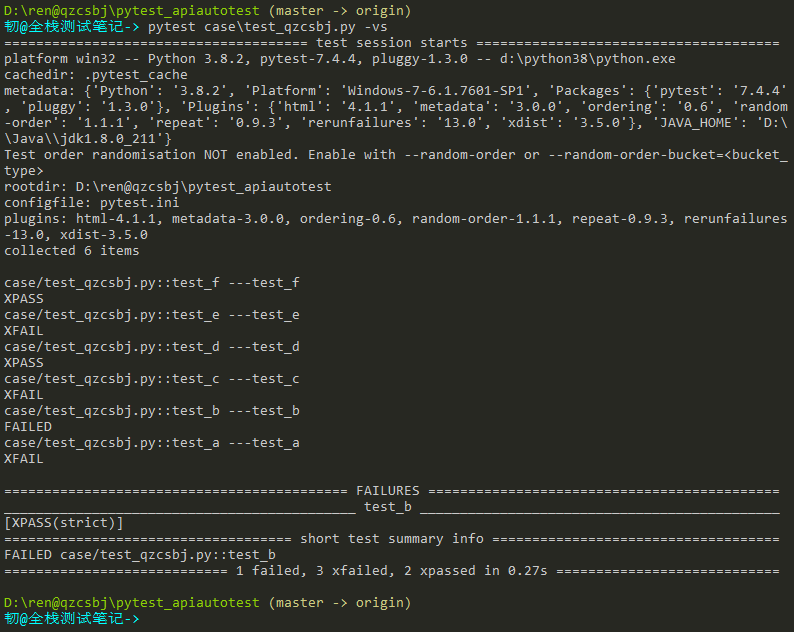
__EOF__

本文作者:持之以恒(韧)
关于博主:擅长性能、全链路、自动化、企业级自动化持续集成(DevTestOps)、测开等
面试必备:项目实战(性能、自动化)、简历笔试,https://www.cnblogs.com/uncleyong/p/15777706.html
测试提升:从测试小白到高级测试修炼之路,https://www.cnblogs.com/uncleyong/p/10530261.html
欢迎分享:如果您觉得文章对您有帮助,欢迎转载、分享,也可以点击文章右下角【推荐】一下!
关于博主:擅长性能、全链路、自动化、企业级自动化持续集成(DevTestOps)、测开等
面试必备:项目实战(性能、自动化)、简历笔试,https://www.cnblogs.com/uncleyong/p/15777706.html
测试提升:从测试小白到高级测试修炼之路,https://www.cnblogs.com/uncleyong/p/10530261.html
欢迎分享:如果您觉得文章对您有帮助,欢迎转载、分享,也可以点击文章右下角【推荐】一下!



【推荐】国内首个AI IDE,深度理解中文开发场景,立即下载体验Trae
【推荐】编程新体验,更懂你的AI,立即体验豆包MarsCode编程助手
【推荐】抖音旗下AI助手豆包,你的智能百科全书,全免费不限次数
【推荐】轻量又高性能的 SSH 工具 IShell:AI 加持,快人一步
· 无需6万激活码!GitHub神秘组织3小时极速复刻Manus,手把手教你使用OpenManus搭建本
· C#/.NET/.NET Core优秀项目和框架2025年2月简报
· Manus爆火,是硬核还是营销?
· 终于写完轮子一部分:tcp代理 了,记录一下
· 【杭电多校比赛记录】2025“钉耙编程”中国大学生算法设计春季联赛(1)
2022-02-23 答疑记录:jmeter从返回的html中提取指定内容